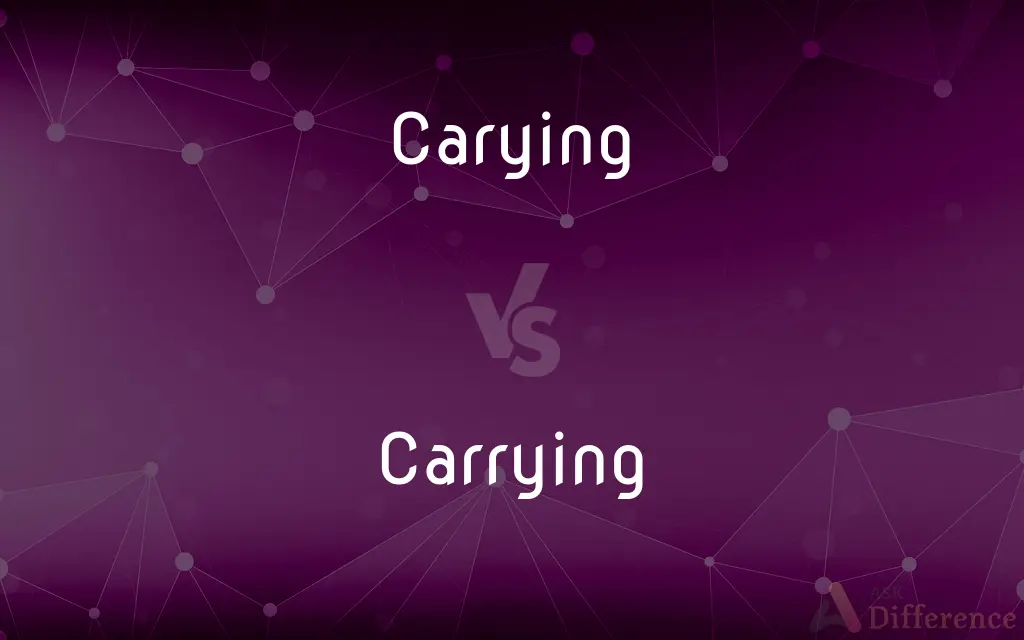Carying vs. Carrying — Which is Correct Spelling?
By Tayyaba Rehman — Updated on March 28, 2024
"Carying" is an incorrect spelling, while "Carrying" is correct, referring to the act of holding or transporting something.

Table of Contents
Which is correct: Carying or Carrying
How to spell Carrying?

Carying
Incorrect Spelling

Carrying
Correct Spelling
ADVERTISEMENT
Key Differences
Remember that "carry" has two 'r's, so its gerund form "carrying" also retains them.
Think of the word "carry" and just add "-ing" to it.
Associate the word "car" with "carrying" to remind you of the double 'r' presence.
Note that "cary" isn't a root word in English.
Mentally visualize a car carrying double 'r's to reinforce the spelling.
ADVERTISEMENT
How Do You Spell Carrying Correctly?
Incorrect: He is carying a heavy burden.
Correct: He is carrying a heavy burden.
Incorrect: The workers were carying the bricks to the new site.
Correct: The workers were carrying the bricks to the new site.
Incorrect: She was carying her backpack all the way home.
Correct: She was carrying her backpack all the way home.
Incorrect: The team was carying the victory flag.
Correct: The team was carrying the victory flag.
Incorrect: Carying the weight of the world on your shoulders is impossible.
Correct: Carrying the weight of the world on your shoulders is impossible.
Carrying Definitions
"Carrying" refers to the act of holding something while moving from one place to another.
She was carrying a heavy backpack.
In finance, "carrying" can mean holding a particular investment over time.
He's carrying a lot of stocks in his portfolio.
"Carrying" can indicate being pregnant in some contexts.
She's carrying their first child.
In mathematics, "carrying" is the act of transferring a number from one column to the next in addition and subtraction.
In the math problem, she was carrying the one to the next column.
"Carrying" can also mean bearing or holding up in a supportive role.
The beams are carrying the weight of the roof.
To hold or support while moving; bear
Carried the baby in my arms.
Carrying a heavy backpack.
To move or take from one place to another; transport
A train carrying freight.
A courier carrying messages.
Chiefly Southern US To escort or accompany.
To serve as a means for the conveyance of; transmit
Pipes that carry waste water.
A bridge that carries traffic between the two cities.
To communicate; pass on
The news was carried by word of mouth to every settlement.
To express or contain
Harsh words that carried a threat of violence.
To have (something) on the surface or skin; bear
Carries scars from acne.
To hold or be capable of holding
The tank carries 16 gallons when full.
To support (a weight or responsibility).
To support the weight or responsibility of
A beam that carries the floor.
A student who carries a heavy course load.
To keep or have on one's person
Stopped carrying credit cards.
To be pregnant with (offspring).
To hold and move (the body or a part of it) in a particular way
Carried her head proudly.
To behave or conduct (oneself) in a specified manner.
To extend or continue in space, time, or degree
Carried the line to the edge of the page.
Carry a joke too far.
To give impetus to; propel
The wind carried the ball over the fence.
To take further; advance
Carry a cause.
To take or seize, especially by force; capture.
To be successful in; win
Lost the game but carried the match.
To gain victory, support, or acceptance for
The motion was carried in a close vote.
To win a majority of the votes in
Roosevelt carried all but two states in the 1936 presidential election.
To gain the sympathy of; win over
The amateurs' enthusiasm carried the audience.
To include or keep on a list
Carried a dozen workers on the payroll.
To have as an attribute or accompaniment
An appliance carrying a full-year guarantee.
To involve as a condition, consequence, or effect
The crime carried a five-year sentence.
(Physics) To possess (an intrinsic property, such as color charge) or convey (a force) that governs particle interactions.
To transfer from one place, as a column, page, or book, to another
Carry a number in addition.
To keep in stock; offer for sale
A store that carries a full line of electronic equipment.
To keep in one's accounts as a debtor
Carried the unemployed customer for 90 days.
To maintain or support (one that is weaker or less competent, for example).
To compensate for (a weaker member or partner) by one's performance.
To place before the public; print or broadcast
The morning papers carried the story. The press conference was carried by all networks.
To produce as a crop.
To provide forage for (livestock)
Land that carries sheep.
To sing (a melody, for example) on key
Carry a tune.
(Nautical) To be equipped with (a mast or sail).
To cover (a distance) or advance beyond (a point or object) in one golf stroke.
To control and advance (a ball or puck).
(Basketball) To palm (the ball) in violation of the rules.
To act as a bearer
Teach a dog to fetch and carry.
To be transmitted or conveyed
A voice that carries well.
To admit of being transported
Unbalanced loads do not carry easily.
To hold the neck and head in a certain way. Used of a horse.
To be accepted or approved
The proposal carried by a wide margin.
The act or process of carrying.
A portage, as between two navigable bodies of water.
(Football) An act of running with the ball on an offensive play from scrimmage
A carry of six yards.
The range of a gun or projectile.
The distance traveled by a hurled or struck ball.
Reach; projection
"a voice that had far more carry to it than at any time in the term thus far" (Jimmy Breslin).
Present participle of carry
Transportation.
Carryings away of goods
The act or business of transporting from one place to another.
We are rivals with them in . . . the carrying trade.
Carrying Meaning in a Sentence
Tom was carrying his little sister on his back.
Are you capable of carrying this box upstairs?
She is carrying a basket of fresh fruits to the picnic.
The porter is carrying the luggage to the room.
The river is carrying a lot of debris after the storm.
The nurse is carrying medicine to the patients.
The cable car is carrying tourists to the top of the mountain.
I saw a cat carrying a mouse in its mouth.
The airplane is carrying hundreds of passengers.
She spends her day carrying messages between offices.
He was carrying a torch to light the way.
The ship is carrying cargo across the ocean.
The balloon was carrying a banner.
The bus is carrying children to school.
The farmer is carrying hay to the barn.
The eagle is carrying its prey to the nest.
The truck is carrying a load of sand.
The train is carrying coal to the power plant.
The bridge is strong enough to carry heavy trucks.
The waiter was carrying a tray of drinks.
The helicopter is carrying a rescue team.
The dog is carrying a stick in its mouth.
The wind is carrying the leaves away.
The pipeline is carrying water to the city.
The conveyor belt is carrying bottles into the factory.
Carrying Idioms & Phrases
Carrying the can
To take responsibility, often for a mistake or misdeed done by others.
When the project failed, she ended up carrying the can, even though it wasn't her fault.
Carrying a tune
To be able to sing in key or on pitch.
He's not the best dancer, but he can carry a tune.
Carrying coals to Newcastle
Doing something that is completely unnecessary because it's already plentiful.
Giving her more books on cats is like carrying coals to Newcastle; she has a library full.
Carrying the ball
To take charge or lead in an activity or project.
When it comes to charity events, Lisa is always carrying the ball.
Carrying the weight of the world on one's shoulders
To feel or act as if one has immense and insurmountable problems.
You look so stressed, like you're carrying the weight of the world on your shoulders.
Carrying favor with
Trying to win approval from someone, especially by doing things to please them.
He's always carrying favor with the boss by staying late.
Carrying the torch
To maintain or uphold a cause, especially after someone else has given up or failed.
Even after the protests ended, he kept carrying the torch for justice.
Carrying the day
To be victorious or successful.
Despite the challenges, our team carried the day.
Carrying on
To continue or proceed, especially in a specified manner.
Despite the rain, the parade is carrying on as scheduled.
Carrying water for someone
To support someone, often in an unquestioning or uncritical manner.
He's just carrying water for the committee; he doesn't ask any hard questions.
Common Curiosities
Which vowel is used before Carrying?
The vowel "a" is used before "carrying."
Why is it called Carrying?
It is called "carrying" because it describes the act of holding and moving something from one place to another.
What is the verb form of Carrying?
The verb form is "carry."
What is the plural form of Carrying?
There isn't a typical plural form for "carrying" as it's primarily a verb in its gerund form. However, in specific contexts, "carryings" might be used, but it's rare.
What is the root word of Carrying?
The root word is "carry."
Which article is used with Carrying?
Both "a" and "the" can be used with "carrying" depending on the context.
Which conjunction is used with Carrying?
The conjunction used would depend on the context of the sentence. Any conjunction could be used depending on the structure and meaning of the sentence.
What is the pronunciation of Carrying?
It is pronounced as /ˈkæriɪŋ/.
Which preposition is used with Carrying?
The preposition used with "carrying" varies based on context. Common prepositions include "of," "on," and "by."
Is Carrying a negative or positive word?
"Carrying" is neutral; it doesn't inherently carry a negative or positive connotation.
Is Carrying a collective noun?
No, "carrying" is not a collective noun.
Is the word Carrying is imperative?
No, "carrying" is not in the imperative form.
What is the singular form of Carrying?
The singular form is "carrying."
Is Carrying a noun or adjective?
"Carrying" is primarily a verb in its gerund form, but it can also serve as a noun.
Is Carrying a vowel or consonant?
"Carrying" is a word composed of both vowels and consonants.
What part of speech is Carrying?
"Carrying" is primarily a verb (in its gerund form), but can also serve as a noun.
What is the opposite of Carrying?
The opposite could be "dropping" or "leaving behind."
What is the first form of Carrying?
The first form is "carry."
Is Carrying an adverb?
No, "carrying" is not an adverb.
Is Carrying an abstract noun?
No, it is a concrete noun when used as a noun.
How many syllables are in Carrying?
There are three syllables in "carrying."
How do we divide Carrying into syllables?
It is divided as car-ry-ing.
What is another term for Carrying?
Another term could be "transporting" or "bearing."
Which determiner is used with Carrying?
Determiners like "the," "this," "that," "my," and "our" can be used with "carrying."
How is Carrying used in a sentence?
"She was carrying a basket of fresh fruits."
Is Carrying a countable noun?
No, when used as a noun, it's typically uncountable.
Is the Carrying term a metaphor?
Not inherently, but it can be used metaphorically in some contexts.
Is the word Carrying is Gerund?
Yes, "carrying" is the gerund form of the verb "carry."
Is the word “Carrying” a Direct object or an Indirect object?
"Carrying" can be used as a direct object. However, its use as an indirect object would be context-dependent.
What is a stressed syllable in Carrying?
The first syllable, "car," is stressed.
What is the second form of Carrying?
The second form is "carried."
What is the third form of Carrying?
The third form is "carried."
Share Your Discovery

Previous Comparison
Availible vs. Available
Next Comparison
Liear vs. LiarAuthor Spotlight
Written by
Tayyaba RehmanTayyaba Rehman is a distinguished writer, currently serving as a primary contributor to askdifference.com. As a researcher in semantics and etymology, Tayyaba's passion for the complexity of languages and their distinctions has found a perfect home on the platform. Tayyaba delves into the intricacies of language, distinguishing between commonly confused words and phrases, thereby providing clarity for readers worldwide.












































